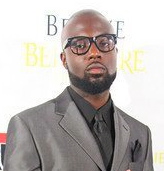
Tinubu
This weekend Ayo Tinubu, 31, teams up with his longtime mentor, former-Atlanta-City-Councilman-turned-AM-1380-WAOK-radio-show-talk-show-host Derrick Boazman, to host the fifth annual “Let Us Make Man: The Gathering to Reclaim Black Manhood.” The two-day forum at Fort Valley State University in Fort Valley, Ga., a small town about 100 miles outside of Atlanta, aims to provide resources for parents, children, educators, churches, community organizations, criminal justice industry workers and child advocates to acquire the knowledge and resources needed to help legions of young black males in crisis.
The forum focused on “redefining black male hood” includes an awards ceremony for exceptional male mentors and breakout sessions that explore such topics as “Law & Black Society,” “Mentoring,” “Educating Black Males,” “Spiritual Development,” “Restoring the Black Family” and “Black Youth Leadership.” Tinubu says he can relate to the challengees many young black males face in our society because he once faced similar problems. He shares with JJIE his perspective on the underlying issues facing young men of color and how he feels this event seeks to address them.
JJIE: What made you get involved in Let Us Make Man (LUMM)?
TINUBU: Derrick Boazman has been a part of my life since I was in high school. I wanted to get involved to help him and I believe in this event.
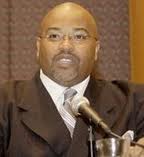
Boazman
JJIE: Mr. Boazman previously worked for your mother so that’s how you two originally met, but he has said there’s an interesting story about how he became one of your mentors. Please share it.
TINUBU: Every child hits a rough spot in their lives and that’s how I met Derrick. When I was in high school I was having a lot of conflicts and getting in trouble at school for fighting. I had gotten into an altercation with some dudes who were bullying me and some of my friends at school. They kept threatening me and I’d had enough. Me and my friends decided that we needed to let them (the bullies) know that we were not to be played with. So we cut school that day and showed up 10 deep just before school let out. We had weapons with us and we were ready for them. A bus driver saw us assembling outside and told the principal who called the police. The police came so we never ended up doing anything, but I got suspended. Derrick came up to the school later and convinced the principal to let me continue going to school. He was able to use his clout [as an Atlanta City Councilman] and assure them that it would not happen again. A lot of people have their lives ruined by such trivial things. I could have made a poor temporary decision that could have affected the rest of my life. It was really the grace of God that saved me from making such a big mistake. Unfortunately too many of my fellow young black brothers aren’t getting that second chance like I did. They don’t have the support that I did at that time. 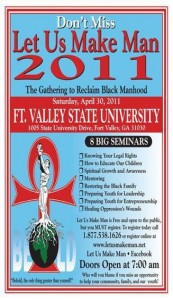
JJIE: In light of the issues you faced as a youth, why do you think this event is critical?
TINUBU: Let Us Make Man is a lot of things to different people. One of the things that it does is let youth know how important their decision-making is; that even the smallest action could have lifelong consequences to it. The speakers emphasize that you always need to ask yourself, ‘is this really worth it?’ A lot of young people don’t have anybody to say that kind of stuff to them, to really make them think.
JJIE: Staggering statistics seemingly stack up against African-American men and boys daily: The highest school dropout and incarceration rates nationally and locally paired with disturbingly low college enrollment and employment numbers. What do you feel are some of the underlying causes behind these statistics?
TINUBU: We’ve all heard the statistic that there are more black males incarcerated than in college and that’s a big problem. When you go to some of these black colleges there are so many females there that you’d almost think it was an all-female school. A lot of black males are experiencing an identity crisis; they don’t know who they are so they are emulating the wrong role models. They don’t have positive male role models in their home or mentors in the community to gain wisdom from to achieve greatness. A lot of these boys get blamed as the problem, but this is really the failure of adults. The educational system has failed them, their families have failed them. They’re born into unstable homes with no real role models. They’re force-fed negativity, violence and misogyny and then are somehow expected to excel.
JJIE: How does LUMM try to address these issues?
TINUBU: It lets the youth know how important their decision-making is; that even the smallest action could have lifelong consequences to it. You have to ask yourself, ‘is it really worth it?’ We try to do what we can to help make a difference in the lives of the young men who attend. We show them that we love them no matter what they’re going through. Let Us Make Man is really about us putting all of our issues on the table. It’s really important to have a venue for men to do that. It’s so funny because every week we have a meeting. It’s supposed to be a planning meeting for the event but every week, it always ends up turning into us talking about what’s going on in our lives. In fact, during the last meeting, a brother (man) poured his heart out and started crying in the meeting about issues he’s been dealing with. He’s a man and he’s struggling with a lot of issues in his life, so you can only imagine what our boys and young men are feeling. They don’t have anywhere to go for support. People see you with tattoos and sagging [pants] and they judge you; they don’t reach out. Let Us Make Man is our way of reaching out to them and letting them know it’s okay to struggle; it’s okay to be dealing with the things they’re dealing with. We try to provide an outlet and some support. We need more people in our community to do that instead of judging them or looking down on them.
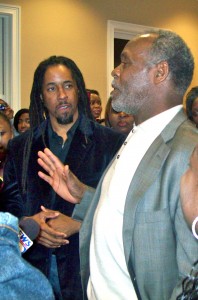
Actor Danny Glover previously headlined the forum.
JJIE: What other underlying problems do you feel contribute to the troubled state of black males in our society?
TINUBU: The family structure is really broken in the black community. In a lot of cases you have black kids growing up in single-parent homes. You’ve got women trying to teach boys to be men and kids trying to raise kids. In that case you need to go outside the family for male mentors to get involved in the lives of these boys. These mothers need to get help to give their sons a positive role model. If the family structure is unstable, the family should extend outside of the household. And when they do, we need men willing to step up and be that role model, like Derrick did for me.
JJIE: What do you think is going on internally with these troubled black boys and young men?
TINUBU: They’re confused; they want to be successful but they don’t know how and society is not very supportive of them when they try. They don’t have a positive male role model in their lives so they look up to celebrities and people in their neighborhood who they see is successful. These are people with tattoos, selling dope and they have a lot of women. That’s why we need more positive images of black men being portrayed. When you don’t feel successful in life you begin to feel desperate. You’ll do whatever it takes to be successful. The same thing that motivates one person to become a doctor is the same thing that motivates someone else to be a drug dealer. Unfortunately for a lot of black males in our society it’s easier to be successful in a negative light than a positive light. They’re following what black males are portrayed as in the media and most of that is negative. They’re fed up with not having things like money and success, so they model what they see on TV and in the ghetto. They lack meaningful opportunities to create wealth. In a lot of cases you see these kids doing what they do because they want to make money. It often boils down to money and wanting to have something that makes them get notices. The problem is that thug life is glamorized and that's far from the truth.
JJIE: What’s the solution?
TINUBU: There’s no one solution, but the answer is for us to pool our resources and help each other. Turning this around is going take the ‘it takes a village to raise a child’ mentality. It boils down to love embracing these young men no matter how they look. I can relate to that myself. If I dress a certain way, people label me a thug and treat me that way based on how I look. When I’m dressed another way people are more accepting. We also need to create opportunities for them to have a better chance at success. Some of them feel that the only opportunity that they have to make money – especially in this economy – is to do the wrong things. We all have to step up and show them that there are other ways and give them a blueprint for success. Schools need to look at bringing back more vocational education. Not everyone is cut out for college, some people just want to work. We’re losing our 9th and 10 graders and we have to find a way to keep them motivated to finish high school.
JJIE: What should LUMM attendees expect?
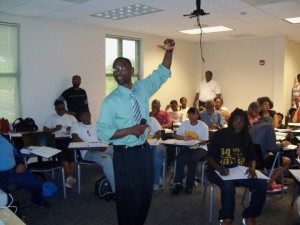
This year's breakout session topics include “Law & Black Society,” “Mentoring,” “Educating Black Males” and “Restoring the Black Family.”
TINUBU: The turnout for the event has grown so much over the years. Last year was my first year; 800 people were expected and 1,500 showed up. Seeing all of those faces at 7 a.m. on a Saturday morning trying to find solutions was humbling.
JJIE: It’s a lot of work putting this on. Beyond your loyalties to Mr. Boazman why are you so committed to this?
TINUBU: I love being in the midst of such intellect – lawyers, accountants, ministers, teachers all kinds of people come out for this. I wouldn’t normally be in those circles if it weren’t for Let Us Make Man. It’s an honor to allow the young black guys who come to get exposure to such people. It’s all about building up this generation and getting what I need to be my brother’s keeper.
JJIE: What would you say is the overall goal of this event?
TINUBU: We feel like if we save just one young man with this forum, we’ve done our job. And hopefully that one will eventually reach out and save another one.
For more information on Let Us Make Man 2011 or to register, visit http://www.letusmakeman.net.
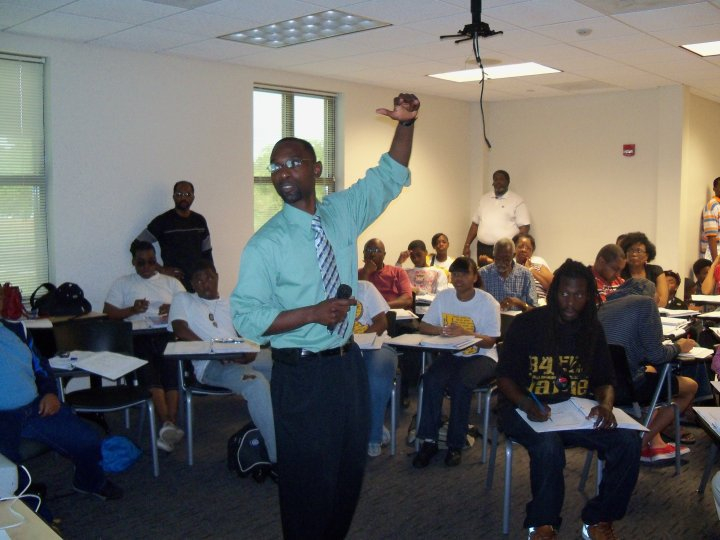
As this country approaches the closing years of the first decade of the 21st century, the African American community is experiencing a crisis of leadership..Where have all the Black leaders gone? Who picked up the torch, after Thurgood Marshall? Was it the ultra-conservative judge Clarence Thomas? Who picked the torch after our beloved dreamer Martin Luther King Jr. was cut down? Who picked up the torch after our shining prince Malcolm X was cut down?
Why are there no Black leaders educating, mobilizing the Black masses to deal with the disintegration of the Black family? Today, over 70% of Black homes are female-headed..Why are there no Black leaders informing and educating the Black community on a national basis to act on horrific abortion rates within the Black community? Today, the Black community’s abortion rate is 3 times that of the White community..Since Roe vs. Wade in 1973, an estimated 14,000,000 Black babies (fetuses) have been killed; 1400 a day! Why are there no Black leaders speaking out on a national basis?
The academic achievement gap between Black non-mainstream, inner-city students and White mainstream students is deplorable, bordering on disaster..Black students graduate three years behind White kids..Black students have a drop-out rate of 53%..If we combine this drop-out rate with the highly conservative estimate that 16% of these students will fail to pass state required exit exams, we arrive at a figure indicating that only 37% of Black students will receive high school diplomas!! “Between the Rhetoric and Reality” Lauriat Press;Simpkins&Simpkins,2009:p-173..